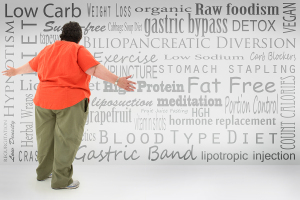 Are you currently forging a battle with your weight that feels hopeless? How many times have you attempted to change your eating habits, just to find yourself right back at square one?
Are you currently forging a battle with your weight that feels hopeless? How many times have you attempted to change your eating habits, just to find yourself right back at square one?
If you can identify with any of these questions, you’re not alone! In fact, the majority of Americans are now overweight or obese. It’s clear that excess body weight is a reigning health issue in the U.S., but what may not make sense is this: If we’re so obsessed with weight loss, why does the battle of the bulge continue? It seems as if every time we turn around, a new fad diet or quick fix for “melting” off fat and acquiring the body of our dreams is just a credit card number away.
The Problem
At the core of any diet or exercise program worth its salt is the same concept: Burn more calories than you consume, and you’ll lose weight. If you’ve ever struggled with your weight, this message may seem a little simplistic. Well, that’s because it is. Yes, if you burn more calories than you consume, you will lose weight. In fact, the physiological mechanics of weight loss are pretty simple. However, mainstream diets and medicine tend to ignore the role that the mind plays in weight issues. For many people, weight loss is not just about calories in vs. calories out. An intricate web of biochemical factors are related to stress and anxiety responses, which may hinder weight loss success. In order to create an effective weight loss strategy, it’s critical to acknowledge these issues, holistically.
What’s a “Holistic Approach” to weight loss?
A holistic approach means that all of the body systems that could affect eating patterns are included in the weight loss plan: mental, emotional, spiritual, and physical. Namely, the biomechanics of stress — a leading cause of weight problems — are tackled.
How do stress and anxiety impede weight loss?
Have you ever caught yourself craving unhealthy snacks or overeating when you’re feeling stressed? The terms “stress eater” and “emotional eating” are thrown around a lot, but most people don’t understand what an incredible role stress can play in weight issues. The simple explanation is that food can affect the brain just as much as any drug can. What makes food an especially dangerous drug is that it’s available everywhere, and society encourages us to indulge in it. Here’s a scenario to demonstrate how stress is linked to poor eating habits: Let’s say you’re feeling stressed at work. The boss is on your case. You come home and the kids are screaming, the dog is barking, bills are piled up on the counter, and the phone won’t stop ringing. All at once, your good intentions to eat a healthy dinner are out the window and you find yourself ordering a pizza or downing a bowl of ice cream, instead.
If you really think about it, you can probably connect poor nutritional choices and overeating with stress. So why does that happen?
The answer is that some types of food are precursors to neurochemicals called serotonin and dopamine. For example, carbohydrates such as white breads, pastas, candies, and cookies are broken down by the system and can be used to produce serotonin. When you’re stressed, a flood of serotonin can help you feel better. So it’s likely that you don’t even know what you’re doing when you’re reaching for candy or chocolate after a rough day, but your brain does! It’s a way to bring your dysregulated biochemistry back into balance by giving it a substitution to create the hormones you need to feel better — at least temporarily. The problem is that, like any substance, the “high” never lasts, and you continuously need to binge on unhealthy foods to keep your mood elevated. The result? A hopeless battle with scale.
How does the approach work?
The concept behind an holistic approach is to get to the root of what’s behind poor nutritional impulses. It’s important to figure out and treat the cause of the stress. By eradicating the negative emotions that lead to poor eating decisions, you can pave the way for creating a healthy diet and exercise plan that won’t be sabotaged by biochemical impulses.
Is a holistic nutritional approach right for me?
If you find yourself in an uphill battle with your weight, a holistic approach to weight loss may be what you need to reach your goals. If you have trouble sticking with your diet or experience impulses to eat that feel beyond your control, there’s a good chance that some biomechanical factors are at work against you.
If you’d like to talk with Dr. Jody about whether or not this might be a good approach for you, she can be reached at drjody@necasm.com.
